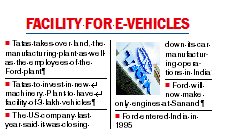Tata Motors is acquiring Ford India’s Sanand plant in Gujarat as part of its expansion plan in electric vehicles (EV).
Tata Passenger Electric Mobility Ltd (TPEML), a Tata Motors subsidiary, and Ford India Pvt Ltd (FIPL) on Monday signed an MoU with the Gujarat government for the “potential acquisition’’ of Ford’s Sanand vehicle manufacturing facility.
Tata Motors said the transaction includes land and buildings, vehicle manufacturing plant, machinery and equipment and transfer of all eligible employees of the unit, subject to the signing of definitive agreements and receipt of relevant approvals.
The financial details of the agreement were not disclosed.
Tata Motors is planning to invest in new machinery and equipment to create an annual capacity of three lakh vehicles that can be scaled upwards to four lakh units.
The company produced 9,100 EVs in the fourth quarter and 19,100 units in the whole of last fiscal.
The owner of Jaguar Land Rover already dominates India’s fledgling electric car market, which the government is trying to grow by offering companies billions of dollars in incentives.
“Rising customer preference for passenger and electric vehicles made by Tata Motors has led to a multi-fold growth ... this potential transaction will support expansion of capacity,” said Shailesh Chandra, managing director of Tata Passenger Electric Mobility Ltd.
Tata last year raised $1 billion from private equity firm TPG for its EV business and competes in the space with Mahindra and Mahindra.
Situated across 460 acres, Ford’s Sanand factory started operations in 2015 and produced the Ford Aspire and Ford Figo.

Last year in September, after nearly three decades of struggling to make a mark in India, Ford Motor Co had announced that it would stop vehicle production at its two plants — Sanand and Chennai — in the country and stop selling all the locally produced vehicles.
It had decided to sell only imported vehicles going ahead as part of a restructuring exercise that impacted around 4,000 employees.
However, the company said it would continue to manufacture engines from Sanand, which will be exported to its global operations.
In the agreement with the Tatas, Ford will operate its powertrain manufacturing facility by leasing back the land and powertrain unit from Tata Motors.
The company had also explored the possibility of using one of the plants to make electric cars for exports and had also qualified for the PLI (performance linked incentive) scheme. Earlier this month, Ford said it was no longer pursuing EV manufacturing for exports.
Tata Motors said its passenger vehicles and EVs have delivered market beating growth with its “New Forever” range of products over the last two years.
The growth momentum is expected to continue with the strong pipeline of future ready products and its proactive investments in EVs. Sustaining this growth will require augmenting its PV and EV manufacturing capacity in the coming years.
“This MoU for a potential acquisition of this unit is a win-win for all stakeholders and helps Tata Motors accelerate the enhancement of its PV/EV manufacturing capacity. The unit is adjacent to the existing manufacturing facility of Tata Motors passenger vehicles Ltd at Sanand, which should help in a smooth transition,’’ it said.
Shares of Tata Motors on Monday ended with gains of 2.96 per cent or Rs 12.70 at Rs 442.30 on the news.
In a separate statement, the state government said the proposed takeover by TPEML of the Sanand plant has resolved the issue of possible job losses. Following Ford’s announcement to shut down its Sanand plant, “nearly 3,000 direct employees and 20,000 workers getting indirect employment were on the verge of losing their employment”, it added.
Moreover, the plant closure also posed a threat to the employment of many others who were working for ancillary units providing parts to Ford.











